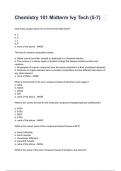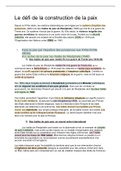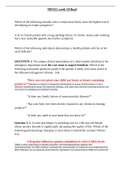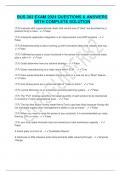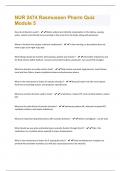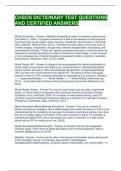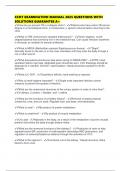Key developments:
1. Exodus of Armenian population of Nagorno Karabakh
● Context: Nagorno-Karabakh is a region in the South Caucasus. Historically,
it's been a point of contention between Armenia and Azerbaijan, with both
countries claiming it as their own.
● Exodus: Without more specific details from your lecture, the "exodus" likely
refers to a mass departure or emigration of the Armenian population from
Nagorno-Karabakh, possibly due to escalated violence, political decisions, or
other threats. Such a movement would have significant humanitarian
implications and could be pivotal in the geopolitical landscape of the region.
2. Tensions in Kosovo escalate further, KFOR peacekeeper force strengthened
● Context: Kosovo, located in the Balkans, declared independence from Serbia
in 2008, but Serbia and some other countries haven't recognized this. There
have been tensions in the region for a long time.
● KFOR: The Kosovo Force (KFOR) is a NATO-led international peacekeeping
force, which was responsible for establishing a secure environment in Kosovo.
The strengthening of this force would imply an increase in international
concern about the stability of the region and a commitment to ensuring peace.
3. Deal with Tunisia creating further controversy
● Background: The EU made a controversial deal with Tunisia to combat
migrant smuggling to Italy.
● Migration Trends: This year, over 230,000 individuals tried entering the EU
illegally, with the Tunisia-Italy route being the most popular.
● Prior Agreements: The EU and Tunisia previously formed a migration-related
"mobility partnership" in 2014.
● Political Climate: Rising populism in Europe, with leaders like Italy’s Giorgia
Meloni focusing on anti-immigration stances, has intensified concerns over
migration.
● Deal Controversy: Tunisia's questionable democratic practices, including
actions by President Kais Saied, and reported migrant abuses have caused
apprehensions about the deal's integrity.
● Deal Details: The EU's proposed package includes €900m for Tunisia’s
economy, €150m for renewable energy partnerships, and €105m for migration
control.
● EU's Broader Approach: The EU has other migration deals, notably with
Morocco, and is considering one with Egypt. Concerns about migrant
conditions, especially in Libya, persist.
4. Meeting of the Foreign Affairs Council in Kyiv, 2 October 2023
● Foreign Affairs Council: This is a configuration of the Council of the
European Union and consists of foreign ministers from the EU member states.
They deal with the external action of the EU, which includes foreign policy,
defense, security, trade, and development aid.
, ● Kyiv: The capital of Ukraine. Holding a meeting here could signal the EU's
support for Ukraine, especially given the tensions and conflicts Ukraine has
faced with Russia over territories like Crimea and the eastern regions.
5. Meeting of the European Political Community in Granada 5 October 2023
● European Political Community (EPC): Assuming this isn't a new development
after my last training cut-off in 2021, the European Political Cooperation
(EPC) was a precursor to the Common Foreign and Security Policy of the EU.
If there's been a revival or renaming of an entity known as the "European
Political Community," it's not something I have specific data on.
● Granada: A city in Spain. The specific topics or decisions made in this
meeting would be crucial to understand its importance.
Last lecture:
1. Veto Players & Overcoming Deadlock:
● Veto Players: In political science, veto players are individual or collective
actors whose agreement is required for a change of the status quo. In the
context of the EU, any member state can serve as a veto player in decisions
that require unanimity.
● Overcoming Deadlock: Deadlock occurs when decision-making reaches an
impasse due to the inability to achieve consensus or the required majority.
Overcoming deadlock can involve compromise, changing decision-making
rules, or using alternative pathways to decision-making.
2. Decision-making: QMV Change Through Different Pathways:
● QMV (Qualified Majority Voting): This is a method used within the EU
Council where decisions are made based on a majority of both the number of
EU countries and their populations. QMV doesn't require unanimity but rather
a qualified majority, which means decisions can be made more efficiently.
● Change Through Different Pathways: The EU has undergone various treaties
and reforms which have modified how QMV is used and calculated. Changes
aim to streamline decision-making and prevent deadlock.
3. The Council of Ministers and European Council:
● These are two distinct, essential bodies within the EU's institutional
framework.
● Council of Ministers (or Council of the EU): Represents the executive
governments of the EU's member states. It's responsible for coordinating
policies, concluding international agreements, and making decisions.
● European Council: Comprises the heads of state or government of the member
states, the European Council President, and the President of the European
Commission. It provides political direction to the EU but does not exercise
legislative functions.
4. The High Representative and EEAS Become More Prominent:
● High Representative of the Union for Foreign Affairs and Security Policy:
This role oversees the EU's foreign and defense policies, ensuring consistency
and coherence in the EU's external actions.

